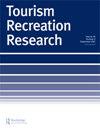研究旅游业意味着自己去看看:共同研究,大流行后的脆弱性和机会
IF 2.6
Q1 HOSPITALITY, LEISURE, SPORT & TOURISM
引用次数: 0
摘要
旅游研究不能仅仅依靠旅游研究来覆盖其研究范围。虽然旅游人类学曾经有过一次持续的复兴,但学科的惯性表明,复兴又姗姗来迟,人类学可能有理由进行重建。旅游作为“学习”的可能性可能仍然没有实现,尽管马尔科姆·克里克(Malcolm Crick)的作品中有重要的先例,在那里人类学准确地解释了旅行加学习。这建立在了解世界的愿望之上,为跨越差异、经济差距、语言、信仰和政治倾向的人类团结做出贡献。因此,呼吁参与人类学的政治、后殖民和本体论概念,包括多地点“田野调查”方法,通过将研究作为人类学家、工人和游客优先考虑的批判性理想主义,重新激活旅游研究。除了特权问题之外,通过人类学重新启动旅游研究,为知识服务,使旅游不仅仅是游学,寻找遗产遗址,或讲述故事的导游。克里克的“自己去看一看”的信条可能是旅游业参与式民族志的战斗口号。在一个更加脆弱的世界中,展望越南未来的民族志工作,本文寻求洞察力和机会,以更广泛地参与人类学旅游研究和旅游研究。本文章由计算机程序翻译,如有差异,请以英文原文为准。
Studying tourism means going to have a look for yourself: co-research, vulnerabilities and opportunities after the pandemic
ABSTRACT Tourism Studies cannot rely upon studies of tourism alone to cover its range. While the anthropology of tourism had once sustained a revival, disciplinary inertia suggests a renewal is again overdue and anthropology might justify a reconstruction. The possibilities of tourism as ‘study’ perhaps remain unfulfilled, despite significant antecedents in Malcolm Crick’s work, where anthropology exactly glosses as travel plus study. This builds upon the desire to know worlds, to contribute to human togetherness across differences, economic disparity, languages, faiths, and political inclinations. Thus, calling for engagement with the political, postcolonial, and ontological concepts of anthropology, including multi-site ‘fieldwork’ methodologies, reanimates tourism studies via the critical idealism of study as priority for anthropologists, workers and tourists. Alongside questions of privilege, re-booting tourism studies through anthropology in the service of knowledge posits tourism as much more than study tours, finding out about heritage sites, or guides with stories to tell. Crick’s credo of ‘going to have a look for yourself’ could be a rallying cry for participatory ethnography in tourism. In a more vulnerable world, anticipating future ethnographic work in Vietnam, the paper seeks insights and opportunities for a new engagement in the study of anthropology as tourism studies and tourism more widely.
求助全文
通过发布文献求助,成功后即可免费获取论文全文。
去求助
来源期刊

Tourism Recreation Research
HOSPITALITY, LEISURE, SPORT & TOURISM-
CiteScore
11.30
自引率
7.10%
发文量
77
期刊介绍:
Tourism Recreation Research is a multidisciplinary international journal now published quarterly; it focuses on research problems in various tourism and recreational environments — ecological, economic, and socio-cultural — and attempts to seek solutions for sustainable development. Contributions are also encouraged on fundamental research concepts and theories. The journal carries regular features such as Research Note, Post-Published Reviews and Book Reviews. The ‘Research Note’ provides opportunity for scholars who have attained sufficient maturity to establish reliable findings in their field of research. The ‘Post-Published Review’ section has been introduced to capture deep insights into the papers that have already been published in Tourism Recreation Research to fill in gaps in the received information. Strong emphasis is laid on original research and readable prose.
 求助内容:
求助内容: 应助结果提醒方式:
应助结果提醒方式:


